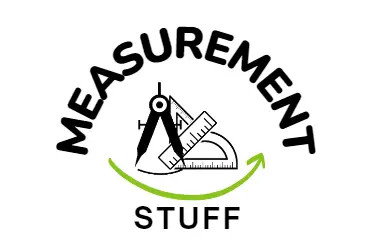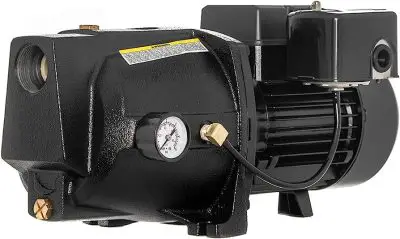Let’s get straight to the point and dive into the comparison of the 1/2 HP vs 3/4 HP shallow well pumps. These two power ratings are often hotly debated among individuals seeking the right water pump for their needs.
In this article, we’ll explore the key differences and advantages of both options, assisting you in making an informed decision for your water supply requirements. So, let’s delve into the comparison between the 1/2 HP and 3/4 HP shallow well pumps.
Difference between 1/2 HP and 3/4 HP shallow well pumps
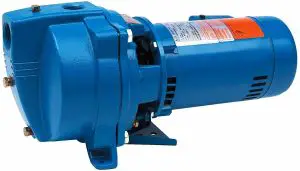
Think of a shallow well pump as a device that helps draw water from a well or a water source that’s not too deep underground. The terms 1/2 HP and 3/4 HP refer to the horsepower rating of these pumps, which indicates their power and capability.
1/2 HP Shallow Well Pump:
A 1/2 HP (horsepower) shallow well pump has a smaller motor and is generally less powerful compared to a 3/4 HP pump. This means it can handle pumping a lesser amount of water per minute. It’s suitable for shallower wells or situations where the demand for water isn’t too high. For instance, if you have a small garden or need water for basic household use, a 1/2 HP pump should be sufficient.
3/4 HP Shallow Well Pump:
On the other hand, a 3/4 HP shallow well pump has a more robust motor and can move a greater volume of water per minute compared to a 1/2 HP pump. It’s designed for deeper wells or situations where you need a higher water flow rate.
If you have a larger garden, more household members, or need water for multiple purposes, a 3/4 HP pump would be a better choice as it can handle a higher demand for water.
Overall, the main difference between a 1/2 HP and a 3/4 HP shallow well pump lies in their power and capacity to pump water. The 3/4 HP pump is more powerful and suitable for deeper wells or larger water requirements, while the 1/2 HP pump is generally sufficient for shallower wells or smaller water needs.
When choosing between the two, it’s essential to consider the depth of your well and how much water you’ll need to meet your specific requirements.
Which has higher horsepower: 1/2 or 3/4?
3/4 horsepower has a higher horsepower than 1/2 horsepower. Horsepower is a unit of measurement for power, and it is defined as the rate at which work is done. In the context of pumps, horsepower is a measure of how much water the pump can move per unit of time.
1/2 horsepower is equal to 0.5 horsepower, while 3/4 horsepower is equal to 0.75 horsepower. Therefore, 3/4 horsepower is 0.25 horsepower or 25% more powerful than 1/2 horsepower.
For example, if a 1/2 horsepower pump can pump 50 gallons of water per minute, then a 3/4 horsepower pump can pump 62.5 gallons of water per minute. This means that the 3/4 horsepower pump can pump 12.5 gallons more water per minute than the 1/2 horsepower pump.
In general, a pump with a higher horsepower will be able to move more water per unit of time, and it will also be able to provide more pressure. Therefore, if you need a pump that can move a lot of water or provide a lot of pressure, then you should choose a pump with a higher horsepower.
Suitable well size for 1/2 HP pump?
The size of a well for a 1/2 HP (Horsepower) pump depends on various factors, including the intended use of the pump and the specific water requirements. There are two main components to consider when sizing a well for a pump: the well diameter and the well depth.
- Well Diameter: The diameter of the well will determine the amount of water that can be drawn from the well per unit of time. A larger well diameter allows for greater water flow rates. Common well diameters are 4 inches, 6 inches, and 8 inches.
- Well Depth: The well depth should be sufficient to reach the water table or aquifer that contains an adequate and sustainable water supply. The water table’s depth varies depending on the region and geological conditions, so it’s essential to consult local experts or well drillers to determine the appropriate depth.
For a 1/2 HP pump, a common well size is a 4-inch diameter well. This size typically provides enough water flow for most residential applications, such as supplying water to a household, garden irrigation, or livestock needs.
However, please note that the suitability of the well size also depends on other factors, such as the distance between the pump location and the water source, the pump’s lift capacity (the vertical distance it can lift water), and the expected water demand.
To ensure an accurate well size recommendation, it is best to consult a professional well driller or a pump system expert. They can assess your specific requirements, the geological conditions of your area, and recommend the most suitable well size for your 1/2 HP pump. Additionally, local regulations and building codes might also impact well sizing and installation requirements.
Suitable well size for 3/4 HP pump?
For a 3/4 HP (Horsepower) pump, a common and suitable well size is typically a 6-inch diameter well. This well size is often used for various residential and light commercial applications.
The larger 6-inch diameter allows for increased water flow rates compared to a 4-inch well, which is advantageous when using a 3/4 HP pump. This combination of pump and well size is commonly used for supplying water to households, small farms, garden irrigation systems, and other similar applications.
However, it’s important to keep in mind that the well size recommendation is not solely based on the pump’s horsepower. Other factors such as the intended water usage, the depth of the water table, and the expected water demand also play a significant role in determining the appropriate well size.
If you are planning to install a well and a 3/4 HP pump, it is advisable to consult with a professional well driller or a pump system expert. They can assess your specific water needs and the geological conditions of your area to recommend the most suitable well size and pump setup for your requirements. Local regulations and building codes should also be considered during the installation process.
Advantages of 3/4 HP over 1/2 HP pump?
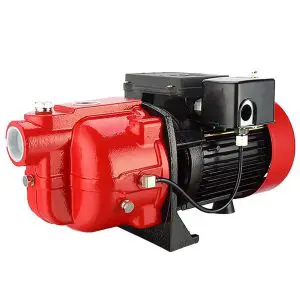
Choosing between a 3/4 HP (Horsepower) pump and a 1/2 HP pump depends on your specific water needs and the intended application. Each option has its advantages, and the right choice will depend on factors such as the desired water flow rate, pressure requirements, and the depth of the water source.
Here are the advantages of a 3/4 HP pump over a 1/2 HP pump:
- Higher Flow Rate: Generally, a 3/4 HP pump can deliver a higher flow rate compared to a 1/2 HP pump. This makes the 3/4 HP pump more suitable for applications where you need to move larger volumes of water quickly, such as filling large water tanks, watering substantial gardens or lawns, or supplying multiple water fixtures simultaneously.
- Increased Pressure: The 3/4 HP pump is capable of generating higher water pressure compared to a 1/2 HP pump. This higher pressure can be beneficial for applications that require water to be pumped to greater heights, like multi-story buildings or uphill irrigation systems.
- Suitable for Deeper Wells: If you have a deeper water source, a 3/4 HP pump may be more appropriate. Its higher horsepower allows it to lift water from greater depths, making it more versatile for wells with lower water tables.
- Enhanced Durability: In general, a 3/4 HP pump is built with larger and more robust components than a 1/2 HP pump. This often translates to increased durability and a longer lifespan, especially in applications with higher demands.
- Versatility: The higher horsepower of the 3/4 HP pump makes it more versatile and capable of handling a wider range of applications. It can accommodate various water usage scenarios, making it suitable for both residential and light commercial applications.
Is 1/2 HP sufficient for small wells?
Yes, a 1/2 HP (Horsepower) pump is generally sufficient for small wells, particularly for residential or light-duty use. The suitability of a 1/2 HP pump for a well depends on several factors, including the well depth, water table level, intended water usage, and the flow rate and pressure requirements of the application.
For small wells with shallow water tables, a 1/2 HP pump is often more than adequate to meet the water needs of a household, garden irrigation, or livestock watering. These pumps can provide a reasonable flow rate and water pressure for typical domestic use.
Advantages of using a 1/2 HP pump for small wells include:
- Energy Efficiency: 1/2 HP pumps consume less electricity compared to higher horsepower pumps, resulting in lower operating costs.
- Lower Initial Cost: Smaller pumps generally have a lower upfront cost, making them a budget-friendly option for smaller-scale applications.
- Suitable for Shallow Wells: If the well has a shallow water table and the total dynamic head (TDH) is relatively low, a 1/2 HP pump is well-suited for the task.
- Residential Use: For most residential applications, such as supplying water to faucets, showers, toilets, and small garden irrigation, a 1/2 HP pump is sufficient.
However, it’s essential to ensure that the 1/2 HP pump is appropriately matched to the specific well and water requirements. If the well is deeper or requires higher flow rates or pressures due to extended water distribution, a 3/4 HP pump may be more suitable.
Maximum flow rate for 1/2 HP?
The maximum flow rate of a 1/2 HP (Horsepower) pump depends on several factors, including the pump’s design, efficiency, and the specific application it is being used for. Typically, 1/2 HP pumps are designed for residential or light-duty applications, and their maximum flow rates may vary depending on the manufacturer and model.
As a general guideline, a 1/2 HP pump can deliver a maximum flow rate of around 5 to 10 gallons per minute (GPM). This flow rate should be sufficient for most domestic water supply needs, such as providing water to faucets, showers, toilets, and small garden irrigation systems.
However, it’s crucial to note that the actual flow rate of a pump will vary based on the total dynamic head (TDH) it needs to overcome. TDH is the combined resistance to flow caused by factors such as vertical lift, frictional losses in pipes, and any other pressure losses in the system. The higher the TDH, the lower the flow rate the pump can deliver.
Additionally, the pump’s performance might degrade over time due to wear and tear or if it is not adequately maintained. Regular maintenance is essential to ensure that the pump continues to operate at its optimal flow rate.
Maximum flow rate for 3/4 HP?
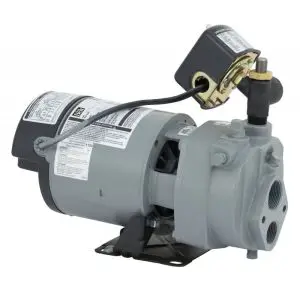
The maximum flow rate for a 3/4 HP pump depends on the specific pump, but it is typically around 75-100 gallons per minute. This means that a 3/4 HP pump can pump 75-100 gallons of water in one minute.
The maximum flow rate of a pump is also affected by the head, which is the amount of pressure that the pump needs to overcome in order to move the water. The higher the head, the lower the maximum flow rate will be.
For example, a 3/4 HP pump with a head of 25 feet may have a maximum flow rate of 75 gallons per minute. However, if the head is increased to 50 feet, the maximum flow rate may decrease to 50 gallons per minute.
It is important to note that the maximum flow rate of a pump is not always the best flow rate for your needs. If you only need a small amount of water, then using the maximum flow rate may waste water. It is always best to choose a pump that has a flow rate that is appropriate for your needs.
Handling lift capacity: 1/2 HP vs. 3/4 HP?
The handling lift capacity of a pump is the maximum height that the pump can lift water. A 1/2 HP pump can typically handle a lift capacity of 20-25 feet, while a 3/4 HP pump can typically handle a lift capacity of 30-35 feet. This means that a 3/4 HP pump can lift water 10-15 feet higher than a 1/2 HP pump.
So, which type of pump is right for you? It depends on your specific needs. If you have a well that is 25 feet deep or less, a 1/2 HP pump will probably be sufficient. However, if your well is deeper than 25 feet, you may need a 3/4 HP pump.
Here are some other factors to consider when choosing a pump with the right handling lift capacity:
- The height of your water tank.
- The number of floors in your home.
- The type of water fixtures that you have.
- The water pressure in your home.
If you are not sure which handling lift capacity is right for you, it is best to consult with a plumbing professional. They can help you assess your needs and recommend the best pump for your home.
In addition to the handling lift capacity, there are other factors to consider when choosing a pump, such as the horsepower, flow rate, and pressure. It is important to choose a pump that has the right specifications for your needs.
Conclusion
On this page, you will get to learn about 1/2 hp vs 3/4 hp shallow well pump. You will get the information on the differences and the advantage one has over the other so you can end up choosing the right one for yourself.
